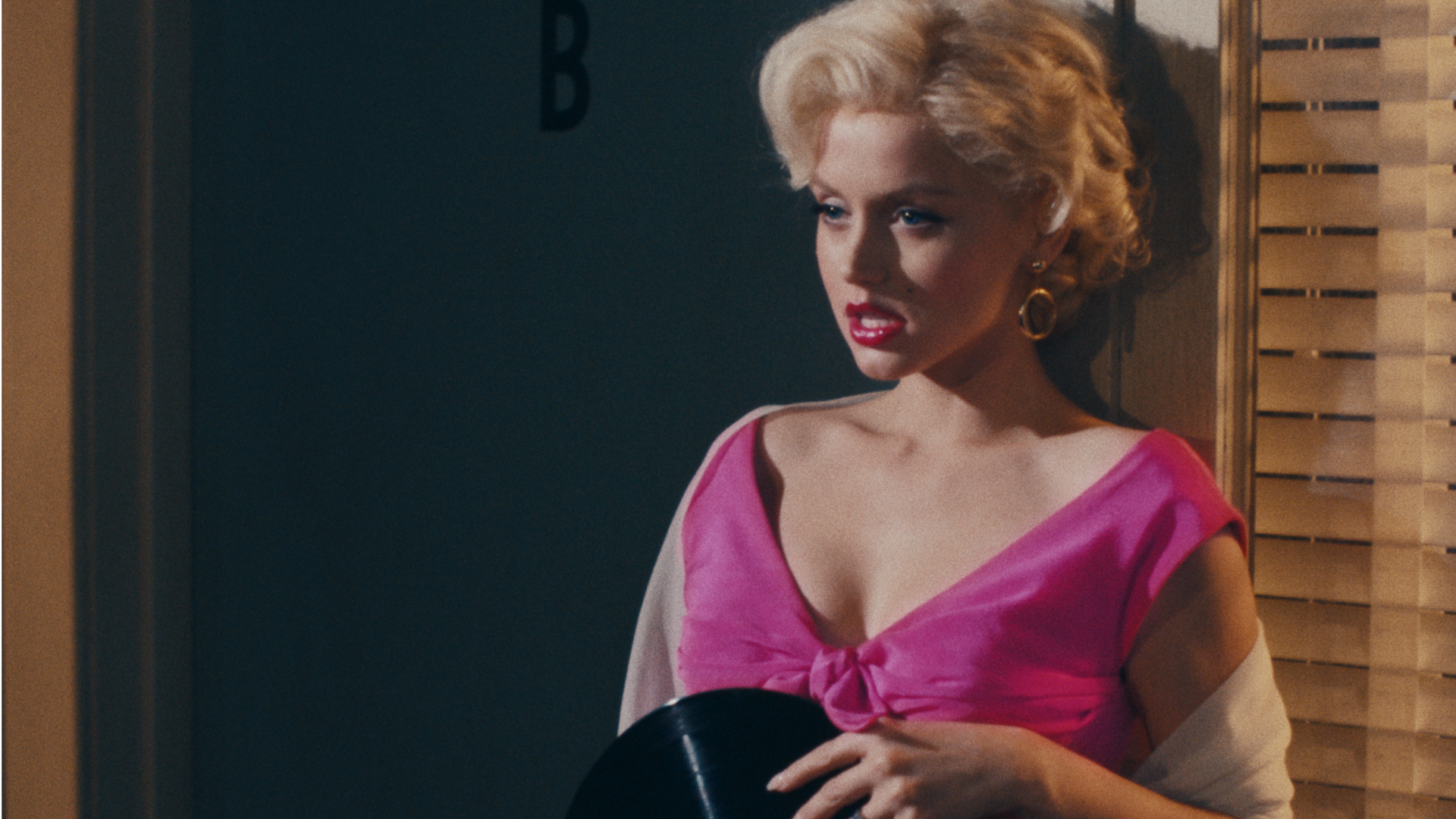GamesRadar+ Verdict
Filthy-gorgeous and kaleidoscopic, Blonde explores Monroe’s complexities as well as the eco-system in which she, and we, operate.
Why you can trust GamesRadar+
The way we consume celebrity and the fact that those who burn white-hot in the spotlight are frequently least equipped to deal with the onslaught is at the heart of Blonde, Andrew Dominick’s gorgeous/grotesque adaptation of Joyce Carol Oates’ fictionalised novel charting Marilyn Monroe’s life.
Though it opens with the intense dazzle of an arc light, the camera pushing in to reveal the mechanical guts of the bulb, Dominick isn’t interested in clinically dissecting the reality behind Monroe’s carefully crafted persona. This is the filmmaker who gave us the dreamy The Assassination of Jesse James by the Coward Robert Ford, after all. Instead, Blonde creates a mood board of the various narratives the star told herself and the public, inviting audiences to assess their own culpability in the ravenous disassembling of the famous.
Those stories begin with the “accursed” child: tiny Norma Jeane Baker (Lily Fisher, wonderful) yearning for a father she doesn’t know and living with an abusive mother (Julianne Nicholson) who is struggling with mental health. “In California,” her ma notes, “you can’t tell what’s real and what’s yourself,” a dichotomy Monroe will battle with throughout her short life.
When she grows up to be the beautiful pin-up with stars in her eyes (Ana de Armas, luminous) the tale that unfolds is one as old as time: casting-couch rape, daddy issues, the transactional worth of a young woman in the studio system. While directors note her ass over her acting and her agent asks if she’s on her period when she stands up for herself, Norma pursues truth in her craft (with acting-class mantra “the circle of light is yours” becoming both incantation and business model as her fame grows). She also begins to struggle with the schism between her interior self and the “thing” that she sees onscreen.
Throw in the impossibility of pregnancy in a business that wants its sex symbols intact, husbands (Bobby Cannavale and Adrien Brody) who can only emotionally or intellectually deal with one facet of their wife, add the voraciousness of fans – and Monroe spirals. By the time she’s giving a miserable blow job to a distracted JFK (Caspar Phillipson), Norma Jean has lost sight of her worth; she’s now a fragile woman objectified and abused by men and an inured public.
Though linear in form, Dominick’s film is no boilerplate biopic, switching ratio and format (from grainy b/w to widescreen technicolour) to mimic the mediums in which we consume Monroe. De Armas recreates iconic moments with eerie verisimilitude: The Seven Year Itch’s subway grate, Niagara’s smouldering, the shimmy of ‘Diamonds Are a Girl’s Best Friend’, Some Like It Hot’s train scene… Blonde also brings to life well-known photos: moments in the garden with Arthur Miller (Brody), larking on the beach in a cardie and her legendary bedsheets shoot (used to devastating effect).
But like Austin Butler’s Elvis (in the film of the same name), de Armas is not merely copying and nailing a cadence or body language. She brings real soul and pain to her portrayal. Her wide, expressive eyes burn with hurt – her growing disgust with, and dependence on, the “magic friend” she sees in the mirror becomes a visceral source of suffering.
Visually, Dominick plays with form to haunting, psychedelic effect. The distortion of reality and the sense of being prey are parlayed into grotesque-faced crowds and faceless lovers/abusers. Elsewhere, a bed becomes a waterfall in an orgasmic threesome where lovers bend and morph like refracted light; an abortion is rendered from a cervix’s POV; and a fraught vomit scene is lensed from the depths of the toilet bowl. The predatory, sometimes discordant soundtrack by Nick Cave and Warren Ellis is equally emotive and hypnotic.
And though beautifully shot (a shame most will see it on a small screen), Blonde descends in its final third to grubby and exploitative imagery, the camera chasing a nude Monroe round a dark house and observing her at her lowest point – which could be read as being as venal as the celebrity carnival that destroyed her, or as a knowing provocation. Do we, as the audience, understand and recognise our own voraciousness at this point, or not?
Uncomfortable viewing, then, but also engaging, unbridled cinema that will prompt discourse and divide opinions. It’s also sadly apt that Blonde premieres at the same festival that a contemporary female star has been gleefully torn down in the name of entertainment.
Blonde reaches Netflix on September 28. For more, check out the best Netflix movies out now.
More info
| Genre | Drama |
Jane Crowther is a contributing editor to Total Film magazine, having formerly been the longtime Editor, as well as serving as the Editor-in-Chief of the Film Group here at Future Plc, which covers Total Film, SFX, and numerous TV and women's interest brands. Jane is also the vice-chair of The Critics' Circle and a BAFTA member. You'll find Jane on GamesRadar+ exploring the biggest movies in the world and living up to her reputation as one of the most authoritative voices on film in the industry.




